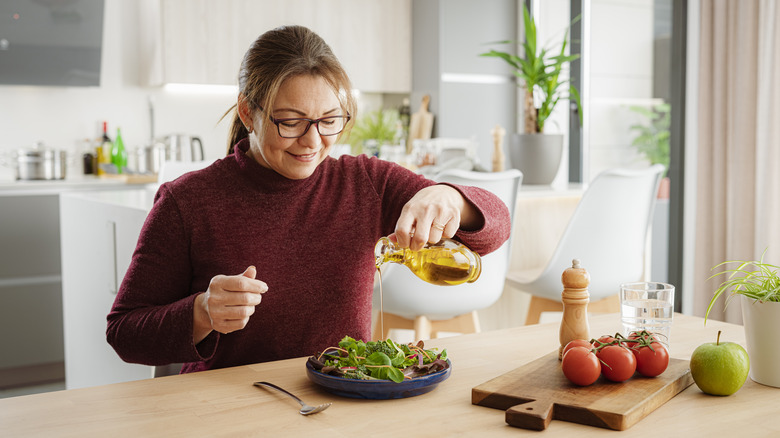What Happens To Your Gut When You Eat Olive Oil Every Day
Enough has been written about olive oil for you to know why it's a great addition to your diet. The plant-based compounds in this Mediterranean-favorite oil have anti-inflammatory and antioxidant properties that support heart health and protect against free radicals, while the fats monounsaturated fats in this oil are linked with lowering bad cholesterol and increasing the good. What's not to love about this grassy-flavored green-hued oil?
Turns out there's an added benefit to olive oil that has to do with improving your gut health. For starters, olive oil has been recommended for when you're constipated. "Olive oil's mild laxative effects can be a safe way to help relieve constipation," wrote registered dietician, Serena Bansal for The IBS Dietician. The fats in the oil can help your stools retain more water and also coat your gut, making for easier passage of waste through your digestive system (via Medical News Today).
A 2014 study published in the Journal of Renal Nutrition found that daily consumption of olive oil helped relieve constipation symptoms in patients undergoing hemodialysis. A 2006 study published in SciELO found that extra virgin olive oil was a significant part of the diet in participants who had more than three bowel movements per week. Something else that happens to your digestive system when you have olive oil every day has to do with your gut microbiome.
Olive oil can increase the diversity of your gut microbiome
The gut microbiome and how the "good" and "bad" bacteria within it live in harmony is a burgeoning topic of interest in science. From what we do know, a healthy gut improves your immune system, protects you from heart disease, autoimmune diseases, diabetes, and cancer, and also has a role to play in your mood. Per a 2018 study published in the journal Food and Function, the plant compounds — polyphenols — found in extra virgin olive oil are directly metabolized in your system. As quoted in the study, "EVOOP (Extra virgin olive oil polyphenols) might influence the composition of the microbiota also inhibiting the growth of pathogenic bacteria". This favorable shift could positively influence your immune system health and reduce inflammation too (via Everyday Health). A 2021 study published in Nutrition Reviews found similar results.
Olive oil's phenolic compounds have been linked with altering gut microbiota in such a way that it aids a person's immunity, weight loss efforts, and cholesterol health, according to a 2020 study published in the journal Nutrients.
"When people talk about gut health and the gut microbiome, it seems like there are some components in olive oil that actually are beneficial when we're thinking about [gastrointestinal] health, and that they help to actually enhance and stimulate the diversity of the bacteria that's in the gut and especially the good bugs that are in the gut," explained registered dietitian, Maya Feller (via Good Morning America).
How you should be consuming olive oil for gut health
If you are privy to the TikTok trend that was asking users to start their day by sipping olive oil first thing in the morning, you'll know that there are various recommendations for how you should be consuming this gut-healthy oil. You don't necessarily have to do that to gain the benefits of this oil, though, according to the experts.
Adding olive oil to your everyday meals by sautéing your food with it or drizzling it on salads is a great way to start. But since the oil still contains fats, you should aim to replace other oils you may have been using with olive oil, to avoid consuming too much fat in your diet.
Also, look for extra virgin olive as this is the best kind, according to the experts. You want oil that's in its purest form with all of its gut-healthy plant compounds and other nutrients. "The process of refining involves high heat, high pressure, and chemicals which can compromise the quality," explained registered dietician nutritionist Megan Hilbert (via Everyday Health). The color matters too, according to Hilbert. What you want is a green tinge to it; it should not be all yellow. As for how much you should be consuming, 1-2 tablespoons a day is a good amount. You might be using too much olive oil in your food if you notice excess calories and weight gain. Diarrhea is a concern too. There's a sweet spot, even with healthy ingredients like olive oil.



